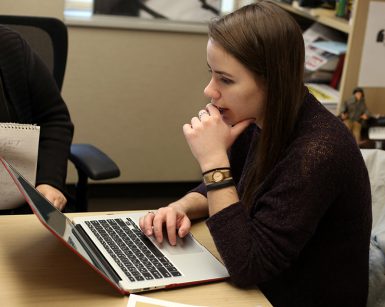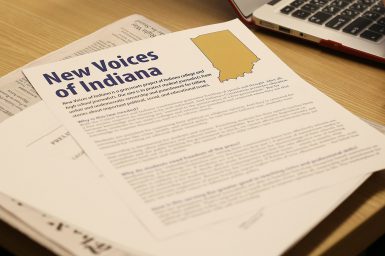School faculty, students support New Voices bill

When the Indiana House hears HB 1130 Tuesday morning, advocates of student journalism press freedom will gather to show their support.
Among them will be Media School freshman Lydia Gerike, who will give a testimony in support of the bill, Indiana Daily Student advisor Ruth Witmer and other advocates from high schools and college around the state.
The bill, dubbed New Voices, would protect high school and college student journalists from suppression of sponsored media. It comes after a history of court cases in Indiana regarding student journalists’ freedom of speech.
During her senior year of high school, Gerike experienced censorship in school theater when her district did not want students to discuss alcoholism in a play. As a high school journalist, she fought the decision and contributed to the policy reversal.
“It opened up my eyes to why something like the New Voices bill is so important, and since I’ve gotten to college, I have met students who haven’t been as lucky as I have,” she said.
The bill provides freedom of speech and press protections for high school and college journalists. It says that a public school, school corporation or state educational institute cannot suppress school-sponsored media unless the content is libelous or slanderous. This will allow student journalists to tackle more serious and controversial subjects than they often are able to without prior review.

A similar bill was proposed in the 1990s but never was passed.
Witmer is on the committee that helped draft the bill, which is supported by the Indiana High School Press Association and Indiana Collegiate Press Association.
“It is in all of our best interests as citizens to support anything that helps young journalists do their job,” Witmer said. “It’s for them, but it’s also for us. It’s for democracy.”
IU Director of Student Media Ron Johnson was involved in the passing of a similar bill in Kansas in 1992 when he was a volunteer for the Kansas Scholastic Press Association. He said he feels high school training should empower student journalists to be watchdogs, and that students can handle the responsibility that comes with less review.
“You can learn a lot in a classroom, but not unless you’re getting hands-on experience and making those decisions and handling the consequences of those decisions,” said Johnson. “That’s what education is all about.”
IU Student Media is independent of the university, so participating students have their own power to publish what they feel is necessary. Witmer said IU Student Media is in a good position because advisors are there to offer advice when students ask for guidance. She said she hopes student journalists throughout the state will have similar opportunities if the bill passes.
“Sometimes it’s not comfortable, and sometimes it’s scary. Sometimes parents and school boards and principals are not going to want you to do this, but if you feel in your capacity as a public servant that you need to tell these stories, you should have the support to tell those stories,” she said.

